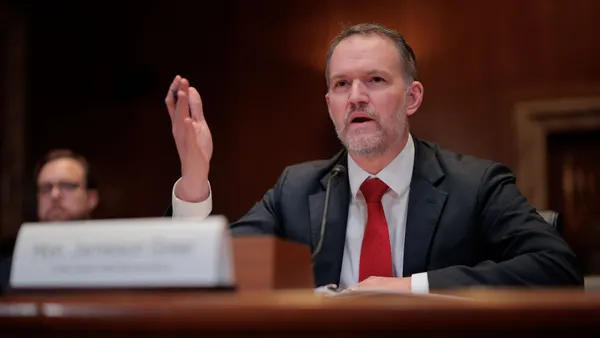Dive Brief:
- Americans for Free Trade, a group of nearly 150 industry associations covering everything from retailers to truck engine manufacturers, sent a letter to President Donald Trump Monday calling for the removal of tariffs when a trade deal with China is reached.
- The letter said the signers are "encouraged" by reported progress in negotiations with China but also concerned about the specifics of the resultant deal.
- In addition to ending tariffs, the organization called for the deal to address unfair Chinese trade practices such as forced technology transfer, cyber theft, intellectual property violations and more; to avoid enforcement mechanisms that could trigger more tariffs in the future; and to provide clarity on the exemption process for the first two lists of tariffs, requesting the process goes on "regardless of negotiation outcomes."
Dive Insight:
Though consensus that a trade deal with China is imminent is rising, there is no such consensus as to the expected terms. On first quarter earnings calls, executives differed on whether they were planning for 10% tariffs to rise to 25%, but no executives expressed plans for a scenario in which tariffs go away completely. Still, this letter proves many businesses wish for a return to pre-Trump trade conditions.
Last month, White House economic advisor Larry Kudlow told reporters some tariffs may need to remain in place even after the Trump administration reaches a final deal with China. President Trump then confirmed the possibility to reporters, stating tariffs could stay in place "for a substantial period of time, because we have to make sure that if we do the deal with China that China lives by the deal."
The signers of the letter said keeping tariffs in place, or using them as part of an enforcement mechanism for the deal, would be a slight to the business community. "American businesses and farmers bearing the burden of the trade war have been told repeatedly by your Administration that they must endure 'short-term pain for longterm gain.' They were promised that tariffs were merely a means to an end, and that all this damage would be worth it. A deal that fails to lift tariffs would represent a broken promise to these hardworking Americans."
The letter links extended tariffs with ongoing economic uncertainty and requests an assessment of the effect of tariffs on the U.S. economy to be conducted by the federal government.
"We believe that any true accounting of the costs of the trade war would disprove their effectiveness as a means for negotiating trade outcomes and reinforce the fundamental truth that tariffs are taxes paid by Americans," the letter reads.
Adding further uncertainty to the process is the exit of the key legal advisor to U.S. Trade Representative (USTR) Robert Lighthizer, Stephen Vaughn.
Vaughn has been general counsel at the USTR office since 2017, joining the office before Lighthizer's confirmation, and will be replaced by Joseph Barloon, a partner at Lighthizer's former law firm.
"Stephen has played a central role in shaping and implementing the President’s trade policies, especially related to China and the World Trade Organization," Lighthizer said in an emailed statement announcing Vaughn's departure.
Chinese negotiators have firmly expressed their desire for immediate removal of existing tariffs as part of a final deal, ironically putting the U.S. business community, at least the portion signed to this letter, in agreement with the U.S. opponent in this nearly 15-month trade war.
Two more rounds of talks begin next week, with enforcement and remaining tariffs the main issues left on the table. Chinese Vice Premier Liu He will visit Washington in two weeks, which many expect will mark the final round or negotiations.














